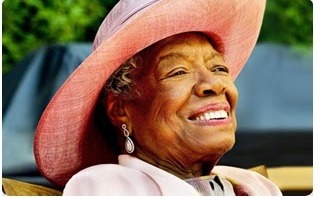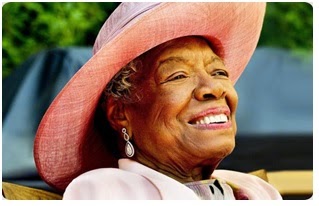At the age of eight, while living with her mother, Angelou was sexually abused and raped by her mother’s boyfriend, a man named Freeman. She told her brother, who told the rest of their family. Freeman was found guilty but was jailed for only one day. Four days after his release, he was murdered, probably by Angelou’s uncles. Angelou became mute for almost five years, believing as she stated, “I thought my voice killed him; I killed that man because I told his name. And then I thought I would never speak again, because my voice would kill anyone…” According to Marcia Ann Gillespie and her colleagues, who wrote a biography about Angelou, it was during this period of silence when Angelou developed her extraordinary memory, her love for books and literature, and her ability to listen and observe the world around her.
She became a poet and writer after a series of occupations as a young adult, including fry cook, prostitute, nightclub dancer and performer, cast member of the opera Porgy and Bess, coordinator for the Southern Christian Leadership Conference, and journalist in Egypt and Ghana during the days of decolonization. She was an actor, writer, director, and producer of plays, movies, and public television programs.
One isn’t born with courage. One develops it. And you develop it by doing small, courageous things, in the same way that one wouldn’t set out to pick up 100 pound bag of rice. If that was one’s aim, the person would be advised to pick up a five pound bag, and then a ten pound, and then a 20 pound, and so forth, until one builds up enough muscle to actually pick up 100 pounds. And that’s the same way with courage. You develop courage by doing courageous things, small things, but things that cost you some exertion – mental and, I suppose, spiritual exertion.
I have kept a hotel room in every town I’ve ever lived in. I rent a hotel room for a few months, leave my home at six, and try to be at work by six-thirty…I never allow the hotel people to change the bed, because I never sleep there. I stay until twelve-thirty or one-thirty in the afternoon, and then I go home and try to breathe; I look at the work around five; I have an orderly dinner—proper, quiet, lovely dinner; and then I go back to work the next morning. Sometimes in hotels I’ll go into the room and there’ll be a note on the floor which says, Dear Miss Angelou, let us change the sheets. We think they are moldy. But I only allow them to come in and empty wastebaskets. I insist that all things are taken off the walls. I don’t want anything in there. I go into the room and I feel as if all my beliefs are suspended. Nothing holds me to anything.
When faced with life’s challenges, may all leaders have the courage and discipline of Maya Angelou.

